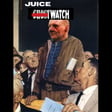Become a Creator today!Start creating today - Share your story with the world!
Start for free
00:00:00
00:00:01

The Long Walk (2025)
When Doug and Tony sat down to talk Savageland (2015), they got into some spontaneous Long Walk talk. Full spoilers from the start.
Trigger Warning:
In the discussion of the film, they bring up some related recent politically charged events
Transcript
Film Pacing and Long-Distance Walking
00:00:10
Speaker
juice hell yeah what's good ah ah before we do savage land how would you feel about squeezing in some short uh i just saw the long walk goodbye off the pier kiss goodnight This is not trying to combine as many things into the wall. You're just making that walk as long as possible. You're taking your your long halftime walk all the way into that segue.
00:00:36
Speaker
The movie should have been six hours to make it like a meta experience. Like if you can't always like... to do the treadmill thing where they go three miles per hour. I remember people being like, that's not even that fast three miles hour. Like, yeah, but in the movie they're doing it for like 600 miles.
00:00:52
Speaker
It's like days. You have to keep doing that. but So it's not easy. To be honest with you, like I bought everything in the film. You know, it's one of those things where you just get caught up into it. Right.
00:01:04
Speaker
But my mind just after a certain point just had to let go the idea that these guys could just fall asleep while walking multiple times. That's the thing where I'm like, that kind of sounds like a thing because I'm like, yeah, bodies are adaptable. They could do that or something. But but it wouldn't be and would just be nodding off, right? either There's no way you could get because you would they were like having legit dreams and stuff and you have to reach like a certain deep level of sleep to like actually have dreams.
00:01:33
Speaker
am like Am I wrong? Yeah. No, you're right. And also like to hit like REM like that to have good, decent dreams, you have to be pretty non-disturbed. Right. And like that's honestly, that just speaks to the comfortability between Cooper Hoffman and Johnson. We'll talk about later.
Logistics of Walking While Sleeping
00:01:48
Speaker
Right.
00:01:48
Speaker
um what it When it comes to, ah you know, the The possibility of falling asleep at that ah circumstance, you know, like I've fallen asleep with my eyes open before I've fallen asleep yeah standing up before. Right.
00:02:02
Speaker
So like I'm almost there. Right. Like I can i I can buy it, you know, for the sake of the movie. Right. But at the same time, like that doubt is always in the back of my mind where just like, yeah. you know, one false move and you just fall right over, right? And your dream self still has like that, you know, so set up oki do yo like I have a sleep disorder and if I didn't take like medication to help me like be awake during the day, I would just fall asleep during it. Like I could fall asleep driving and I don't think that I would keep driving the car normally. I think I would just crash if I fell asleep. I don't i don't think it would be like, oh, my reflexes have chicked in and muscle memory. It's like, Your muscles also just are relaxing too. You know, it's like you're recuperating time for the whole body.
00:02:48
Speaker
isn't And then there's also just the concept of somebody who is sleepwalking like in a traditional sense, right? Like when you, when you know someone who sleepwalks, right? Like they're not like accurately wandering around. They're bumbling into things, right? Like they're, yeah they're sloppy, right?
00:03:03
Speaker
So like this idea of them walking at like a three mile per hour pace while they're passed out, you know? Yeah. They should have been it's like bumping into the, into the convoy, into the Jeep. So there was like, and then like bump into it and like get shot
Societal Critique in Film
00:03:16
Speaker
or something. Yeah.
00:03:17
Speaker
Yeah, more warnings, right? And that's one thing about the the film that's actually, to its credit, like getting away from this like minute CinemaSins-ass critique we have. ah with the the note daniels the stars un real do prepare You know,
00:03:32
Speaker
um I feel like ah the the film does such a great job at just showing you like all the questions you would have, no matter how stupid or broad they are, right? like I've said this a few times now, but I'll say it again.
00:03:46
Speaker
fact that you see them peeing and pooping while they're walking, you know? Yeah. like This is a logistical thing where i'm like, how? And then also food and water is addressed, too. And it's like, oh, oh okay, they they'll refill your canteen because that's not...
00:03:58
Speaker
What the challenge the challenge is like, you know, the endurance of it all. And they're not going to you won' you won't you won't. Someone won't lose because they have starved or like dehydrated. You know, it's like they'll make sure you have the fuel in that regard to keep going. And that's actually getting to something that's even crazier about the long walk, which which is like why they are doing this. Right. Like, what is the purpose of this whole long walk thing? And the more that you dwell on it and you think about the circumstances of it, it doesn't really seem like it is all that successful. Right. Like, it seems like in terms you of the people America, the other goal of like what it does for America raising the GDP.
00:04:37
Speaker
Yeah. yeah Like, that's what they said. It helps is they're like, oh, we hit into a very productive ah boom for our industry and we make a bunch of money after the long walk. And it's like, I believe that on maybe on good There's that, right? But then it's also like, I'm sure like ah in a propagandist sense, you know, or in a, you know, rallying the troops way, you know, it gets people excited in that sense, right? But whenever we see other people in this film, it's only the cops who are excited. Everybody else is like terrified when these people are walking into town, right?
00:05:08
Speaker
The ending, you know, with that crowd, you know, there's a reason why they're faceless in my eyes, right?
Character Dynamics and Performances
00:05:13
Speaker
um But this is to get back to what we're saying about like the logistics of this event, right? Yeah. What's interesting is that like the idea of just walking for several days. Right.
00:05:22
Speaker
And then all of these rules. Right. They feel so arbitrary. Right. Why wouldn't they be OK with giving them that water and that food, but then not also give them like a 15 minute washroom break.
00:05:33
Speaker
Right. Right. It's like letting them sleep one night in the middle. Right. Like there there are a few steps that they go that make it just that extra bit of cruel. Right. And it just speaks to the world itself. Yeah.
00:05:45
Speaker
Yeah. ah it's It's a very cruel and in heartless work because the glimpses we get, i mean, obviously no healthy society is going to do something like this. So any like little hints of the world outside are are cool. And and I mean, rem reminiscent of any other dystopian thing, like how ah Cooper Hoffman's father, like, you know, like he had banned you know reading materials. It's very, you know, Fahrenheit 451.
00:06:12
Speaker
almost said Fahrenheit 9-11. I'm like, no, that's Michael Mann. Michael Moore was his father. Now that would be a twist. the Damn. You flashback to the house. just Yeah. He should act. Why is he in just like regular dramatic films?
00:06:27
Speaker
don't know. Honestly, he's pretty like he's a good entertaining presence. He's the reason why his movies are very watchable. He's a likable guy on camera. Right. So, like, yeah, why not? Right. And and and I mean, like physically, he's fairly close to Philip Seymour Hoffman a bit, you know, like similar faces and more body structure. ok Yeah. Yeah.
00:06:48
Speaker
yeah but By the way, like I feel like ah like I say this every time with like when there's a Cooper Hoffman movie, but even though you can see like the shades of Philip Seymour Hoffman in him, I still feel like he's his own actor with his like own skill set, right?
00:07:05
Speaker
And every time I see him act, he sleeps me off my feet, really, like because he's very versatile. He's very... like he Like he's a different talent than his dad, but he still has the same love for the medium, which is I find really cool.
00:07:19
Speaker
I love for the medium. And it's easy to love him. ah Like, I mean, his character in Licorice Pizza is like and I could watch like a whole series about that guy, you know, like just like coming up some kind of get rich scheme every week or something. Find new ways, get money out of Leonardo DiCaprio's dad. Yeah.
00:07:39
Speaker
but um and And even ah Saturday Night, right? Like he was really good in that movie, despite it being a real giant turkey, right? He does like does like his ah though the Philip Seymour Hoffman point at one point. like they Like, I agree with what you're saying, Mahan. You you occasionally see like, yeah, this is when he's stanced up and stuff.
00:07:57
Speaker
Yeah. Yeah. He does like the little like ah you can even see it in the long walk. Right. There's there's a point where he does like where he puts both of his hands out like this, which is just a classic Philip Seymour Hoffman move.
00:08:08
Speaker
And also like I think he says like shit or fuck at one point and he says it really quickly like shit. um Right. Like something like that. and And that, again, is also just like a classic Philip Seymour Hoffman delivery. Right.
00:08:21
Speaker
But then like, you know, during the more tender moments during like, you know, just the bonding of friendships and joking around and stuff. I feel like he's really adding a lot of texture to the material that's given to him, as well as ah Johnson. David Johnson, I believe, is. is very Yeah.
Themes and Director's Intentions
00:08:35
Speaker
OK, do you think I haven't read anyone's take on this, but and it could just, you know, I'm perfectly fine with it two men who love each other in a platonic way and like they aren't form a friendship. But do you think there's open for interpretation of David Johnson's character being gay?
00:08:53
Speaker
Totally. and And honestly, from what I've heard from people, it was actually more pronounced in the novel. Right. So the thing is, is that um when I was watching the film, right, the way I took it was that there was deeper relationship there. Right.
00:09:06
Speaker
Like ah think about it this way. Right. ah Cooper Hoffman talks about a girlfriend that he broke up with, like before going on the walk. We never see like a flashback to her. Right. She really did not like see factor into that equation emotionally for him at all.
00:09:20
Speaker
Right. And then there's kind of a look that he gives when he has, do you have one? He's like, no. And we kind of hold on him as he like says after he says that. And I'm like, oh, OK, is that so that's mean something. And then other people call it out. And then when they call it out, they're both still flustered about it, but they don't even talk about it. Right.
00:09:39
Speaker
I think that that reading is totally there. Right. And I think that even the way that the ending is played, it feels more like lovers than friends in my eyes. Right. However, right. I do think that, you know, Francis Lawrence himself, I don't think he's like, you know, some...
00:09:53
Speaker
daring, edgy filmmaker, though this film makes a good case for him being that, right? um I think that what he was more intending was the platonic route, right? But because the actors are so strong in selling their relationship in that way, um and so perhaps because there is that connection to the novel and having that kind of approach, and perhaps they went a bit further than the way the film was meant to be conveyed, is how I took it.
00:10:17
Speaker
Right. Like, because did Christopher Nolan mean Tennet to be a gay love story or does Bob Pence and just have that much chemistry with someone and that, you know, he can make it feel like that? Oh, yeah, they're in love. ah ah Or I don't know, you know, maybe Nolan just is, you know, subconsciously putting that in there. I mean, all British people are a little gay. so You
Film vs. Military Experiences
00:10:38
Speaker
saw the scarf he was wearing.
00:10:39
Speaker
Come on. Like, yeah. And Christopher Nolan wears that scarf, right? Like, come on. No one wears a scarf like that unless they're a little zesty. Right. And and that's OK, you know. Yeah. Yeah. I mean, that's what makes the movie. kind I mean, there's other cool stuff intended, but that's that's kind of makes what makes it one of the more interesting Nolan entries for me is that relationship because you don't really have.
00:11:01
Speaker
I mean, yeah he's not a. a there's a a love in his movies, but it's usually familial love and like the, like romance interests are usually like dead, you know? So like having, having, right. Yeah. So having like an active, like we get to see like the arc of that relationship play out is, is kind of unique. Mm-hmm.
00:11:24
Speaker
and And then just ah to bring it to back to the long walk, right? Like, I feel like um a lot of Tenet is about, like, one person being more aware of how good of a friendship they have than the other, right? So there's, like, a little bit of that charm and mystique to that, right?
00:11:40
Speaker
It allows for a lot of questions for John David Washington's character, right? Yeah. But with the David Johnson and Cooper Hoffman, as they're walking through this event, right, they are next to each other, side by side. Everything bad that happens to one of them happens to both of them, right?
00:11:56
Speaker
And they ah Johnson puts himself on the line much more than Cooper does, right? And at no point does he ever expect anything in return, right? Right. And so there's just something about that kind of connection because it feels like bonding through war, bonding through a massive traumatic event. event But then it also does have that deepened emotional context because they open up to each other so well.
00:12:20
Speaker
Yeah. I mean, ah essentially, you mentioned bonding through war because that's one of the number one things I thought of when they were having the conversation about like
Economic and Social Pressures
00:12:27
Speaker
you know, volunteer for the, you know, like you're selected from a lot of, but it's not like everyone up for great. It's not like a draft. Like you have to like sign up to be eligible to be in the long walk. And he saying, like, do you know anyone who doesn't sign up?
00:12:41
Speaker
I mean, it's not a one for one because it doesn't quite work this way in our boxing of the military of how there's all the financial incentives of like, that's a, like one of their biggest recruiting recruitment tools of like, Hey, we'll pay for your tuition. Like, you know, and you get the, you know, it, it, it gives, it gives people an out who don't and have another way, you know, who don't see another path there. The army is like, no, we got you. Come, come over here.
00:13:07
Speaker
And you're most likely to, and I mean, okay, the ma mortality rate's not as high because it's like 99% of all people do the long walk diet, but it's, you, even if you don't die, you're gonna, you're, you're sacrificing something. Mm-hmm.
00:13:20
Speaker
Well, like the the thing, the the military comparison is a great point because like being in the American military doesn't have a draft these days either. Right. The difference is, is that there's a massive depreciation of people signing up because, you know, they don't want to go die. Right. They don't want that possibility. Right. Well, there's there's no war worth, die you know, like there's no war. Yeah, that too. They can't sell ah ah in terms of like, yeah, you need to do.
00:13:46
Speaker
I mean, they recruited. So there's so many people enlisting post 9-11 because that's when people's emotions were like at a fever pitch. And, you know, they're like, yeah, we got to we got to get those bastards, even though we were going places for it the people who did it. weren But, you know, they were still able to to capitalize on that. And ah we don't really have that Yeah.
00:14:06
Speaker
And also it's a depreciative thing, too, where it's like over the years, you know, how many of those conflicts does America get itself into only to regret it later? Right. And as much as the government likes to think that people don't forget, they don't. Right.
00:14:19
Speaker
Sorry, the way the government thinks that the people will forget, they don't. Right. So it's a problem where ah it's kicking the can further and further down and the can somehow is getting bigger and bigger. Right.
Character Development and Film Score
00:14:32
Speaker
And now it's a point where, ah you know, there's that depreciating. ah signing up because of a lack of, you know, putting your life on line for wars that you don't care about. Right. But then on the inverse, right, where you're talking about people who are in the most desperate situations, who maybe they're, you know, suffering several generations worth of poverty. Right.
00:14:51
Speaker
And they see an opportunity for them to finally go to college or university. Right. And ah it's sold to them as like being able to see the world. Right. And then they get into it and, the all hell breaks loose, right?
00:15:03
Speaker
And the types of people they're surrounded by are people just like them, right? Who thought that this was the best deal they had in their hand, right? And that's where I come at the long walk with as well, where it's like, how bad is everything happening?
00:15:17
Speaker
where these people think that entering into this lottery just for the chance to be the one person is worth actually doing rather than trying to survive in a society as it exists, just outside of the view. Yeah.
00:15:29
Speaker
i And I love the fact that we don't get too much of their backstory out of the generic of like, yeah, they're doing it for the money and the wish. ah ah But then you find out more usually towards the end for the characters like Hank, we don't find out that he had a wife until he dies.
00:15:47
Speaker
ah yeah Yeah. Did you know that he had a wife? I'm like, what? Hank was the best character. loved Hank. yeah of Oh, the ah the four Musketeers. Yeah, he was great. And his his death was so heart-wrenching how he calls out to Arthur and then Arthur goes back and then you think they're both going to die.
00:16:08
Speaker
and then cooper cooper ah Cooper Hoffman has to pull him away of like, no, no, no, he's gone. He's gone. who It's fucked up. And the way it's filmed, too, like though it's like raining. Right. And it's like really like the the the lights are blaring. Right. Everyone's just shouting. Right.
00:16:25
Speaker
When the movie really goes for like the over the top, like sentimentality, which is at the core of all Stephen King stories. Right. Somehow it just nails it every time, which is why i really enjoyed The Long Walk in general. Honestly, I do just wears its heart on its sleeve and doesn't like break its face at any point. Yeah, i and also I feel like the score does a a long way ah goes a long way to towards achieving that like achieving like the right kind of tone where it's like not like not too treacly or sentimental, but also leaning into that when you have those moments. I was just looking up what Jeremiah Freights had done others. Okay, so he scored the Hunger Games movies.
00:17:05
Speaker
ah Oh, yeah, that makes sense. um But i I really thought the score ah did a good job of
Modern Film Industry Critique
00:17:12
Speaker
of conveying all that. And it's traumatic every time, even without the characters that you've grown attached to.
00:17:19
Speaker
ah oh and what the other thing about Hank's death is when he keeps yelling, I made a mistake. He's like, I'm like, that's another thing that's like recurrent with all these guys is the regret because then Cooper Hoffman sees Judy Greer knocking it out of the park. Like she gets like five minutes of screen time and then she shows up. She's like, I got she like Babe Ruth's that shit. She's like, I'm going knock it out the park. And then she does.
00:17:42
Speaker
um But yeah, when he's like a lot of luck recently, by the way, she just keeps on popping up and things and just nailing it. I mean, She's a phenomenal the actress and she's like underserved by a lot of stuff she's in. Like she's like to prove the wife in the Ant-Man movies. And it's like, yeah, ah do you have something better for fucking Judy Greer other than just being Paul Rudd's ex-wife?
00:18:06
Speaker
Judy Greer, who like maybe her middle name should just be should have an Oscar by now. Like, I feel like she is one of those like truly versatile actors who can slip between that comedic and dramatic spot. Right.
00:18:19
Speaker
And, you know, like we we talk all the time about like the Adam Sandlers. Right. But I feel like, you know, the women don't really get as much credit for being able to do the exact same thing. Right. Like. Think about Kristen Wiig. Kristen Wiig is a great, fit's fantastic a dramatic actress, right? But she does not get the same opportunities that, you know, an Adam Sandler would get, right?
00:18:39
Speaker
um And we don't hear as much anymore. is it Is it purely misogyny? Is it the death of the studio comedy? but is it Is there a taint that follows any he anyone? Well, except for Melissa McCarthy. was going say it's the Ghostbusters 2016, but Melissa McCarthy seemed fine after that. ah Oh, yeah. Like,
00:18:57
Speaker
i I mean, she has the benefit of her husband made makes like half of the movie she's in. But like, I think that she was just like a box office draw regardless. But did what did did did Ghostbusters kind of leave a stink on everyone else involved? Honestly, I don't think Kristen Wiig got the stink from Ghostbusters. I think she got the stink from ah Wonder Woman, too.
00:19:17
Speaker
I feel like that movie was such a... I forgot that she was in that movie. i feel like I feel like when that movie came out, like she was the least scathed, right? But specifically Gal Gadot and Pedro Pascal, there was a lot of like hate thrown on them for that movie. And i've I've never seen it, but from the clips I've seen, seems well-deserved.
00:19:36
Speaker
It looks like a really bad movie. ah but It's a bad movie, but my hot take is that Pedro Pascal is kind of good at it. Because they're like playing... It's intentional that his he's like kind of doing a Trump thing as Maxwell Lord, but it's it baked into the narrative that this is a Hispanic person who's like trying to be white, like that. That's like right part of his backstory. And he's like play fully playing that like insecurity of like, am I i'm I'm like he's overperforming so he can be like, no, I belong here. I'm white.
00:20:09
Speaker
i but I want to touch on that point specifically because there's a ah connection to the long walk. But before we move on from the Ghostbusters 2016 of it all, I think the only people who are named by that movie were Kate McKinnon and Leslie Jones. Leslie Jones were like, sure. And I mean, we don't. There's obvious reasons why she gets the brunt of it being a black woman and because it's like she's not like she was.
00:20:31
Speaker
more I'm not offended by that movie I mean Ghostbusters was my favorite movie as a kid uh but I also i not overly precious with things and it's like if anything that movie better than the sequels that follow it because it's at least trying to be a comedy you know you can dominate how successful it is that you know Apatow era of let's just let the camera run we're gonna riff a while isn't wasn't never sustainable but like it's You're still going to get some
Character Dynamics and Societal Parallels
00:21:00
Speaker
laughs out of it. And it's like I said, like it's it at least understood the assignment in that regard of like, no, these are the comedic vehicles. You know, like this is not like an action adventure of franchise. The big problem with modern Ghostbusters and our series.
00:21:16
Speaker
hate myself for saying that is ah the the the whole focus of the series should be about working class blue collar people, right? And yeah should be a commentary on how tough it is to have a small business in New York.
00:21:29
Speaker
I'm not saying that as a joke. I'm saying that, you know, that's what Ghostbusters is, right? And all of the more recent films, you know, like Ghostbusters 2016, I don't think I, like I never really saw that one either, right? But I don't think they really struggled much in that film to do what they wanted to do, right? It it it breezes past that. It's like more of the struggles, less of financial. And even though they do have jokes at the ah how poor they are initially, it's mostly just the no one believes them and believe that they have to overcome at stigma of people being like, oh, these crazy ladies. Yeah. yeah And so right ah that's that's.
00:22:06
Speaker
That's their substitution for it But yeah, it's not the same as the first one's about friends starting a business. isn And then also like with the more recent films from ah the other right and then right. ah Those are like these like legacy sequels focusing on children. and It seems Angler family. Egon had based on the timeline. I think that means he already had Carrie Coon during Ghostbusters 2. Like wait, what? love it. He has an auditorium that kind of takes Ghostbusters 2. I'm like, Egon, where's your kid?
00:22:40
Speaker
Like ah the city's about to get destroyed and you're just not doing anything about her. You don't care. youre you're You're too busy sleeping with the secretary. Come on, what's going on there? ah have been that Right. And to have you not be the the mom, too, is we I'm like, so who is that the mother is like never.
00:22:55
Speaker
but are Like, are they saving that for some long, some sea hole in the future? I'm like, the where did Carrie Coon come from? Did Harold Remus clone himself or something? like I hope they make a third one because I really like the idea that they were like, for the second one, what are we going to do with this one? We're going to it really cold.
00:23:14
Speaker
I want to see what kind of thing they come up with next for they're like, you know, for this time, we're just going to make it really hot. i would now well Finally, we moved away from Gozer and all the like doing because even though that remake has them like it it's Gozer adjacent. It's like the the this is a ah a like that's not an interesting enough villain to have it be recurring things. You're like, OK, so what's the new thing? It's not Gozer.
00:23:37
Speaker
What if Gozer was cold? Yeah. but do fit Cool as ice, you know, like that seems to to be like the only idea they had. I want to get back to the long walk because you were talking about Pedro Pascal and the way he was putting on airs, right? i didn Yeah. and so and And I feel like ah not in the same way, not in a racial context, obviously, for the long walk. But I want to talk about Mark Hamill. Right.
00:24:02
Speaker
As like this commander character. Right. And this idea that he is. on basis I'm growling continually. yeah I'm Mark Hamill. Do it for you. Look too close at my face.
00:24:14
Speaker
and I got these shades on and that's all. You know, like. uh the the what i really like about him is uh you know he's this major threat he's the cause of pain in everyone else's lives but he is so enigmatic that people can't help but like joke around with them and stuff and it's mainly because he talks about balls all the time he's like backhandedly complimenting all of the kids as they're getting shot right yeah and it's a very very strange dynamic to play with and and Mark Hamill, like, you know, he's always been a good actor in voice
Interpreting the Film's Ending
00:24:48
Speaker
roles, right?
00:24:48
Speaker
I feel like more recently he's been doing well in live action stuff again. And and this is probably one of the better performances I've seen from him in a live action role. Like he's, he is very imposing and and I buy him in that part, you know?
00:25:02
Speaker
Yeah, because even if you could ah say like, oh, he's overselling it, but I'm like, the character's overselling it. So that that fits like that. He's, you know, really trying to convey that he's a like, you know, in the actual world of the movie, he's not the head.
00:25:19
Speaker
but of the government or the even the head of the military, but he seems that way. He like carries that authority where he's like, I run this shit. And that's actually where I find the ending kind of let me down a bit, right? Because I got that impression as well throughout this film, right? I think that all the people who live in America at this point, they believe that a commander is the the leader, right?
00:25:39
Speaker
But the commander is nothing more than like a military spokesperson, right? least the He's the showman of it all, right? So when we get to the ending and David Johnson gets the carbine for his wish, right?
00:25:50
Speaker
um i and I like the i implication of surreality. And i I would have liked that direction to have been followed through on if it was intellectualized in a bit more of a cohesive manner.
00:26:02
Speaker
ah But the idea that he shoots him and then the movie just kind of ends, right? I would have liked to have seen a bit more of like the mechanics of that or at least Johnson's headspace a bit better.
00:26:14
Speaker
Because like if the Cooper Hoffman says when he tells David Johnson his plan, they're like, you're just going to get yourself killed. You're ah youre just like your're your dad. And he's like, well, we don't know that. Like the wish, it seems like you could kind of just get a freebie when you get your wish. He's like, this is uncharted territory. So like, are we to believe that they actually you could look at the ending one or two ways of like he shoots the major And they just let him leave because there's other soldiers there. They're they're not like arresting him or immediately opening fire.
00:26:44
Speaker
Or you can see like, yes, they do shoot him. And that's like in his like, you know, his mind's like him walking off into the the night is like, you know, metaphorically like, but he's he's gone.
00:26:55
Speaker
So like a part of. Yeah, a part of me reads a lot of the ending as just a metaphor because of what I was saying before about the crowd. Right. Like, think about it. You've got like it's raining. Right. So things are obscured for sure. Right. But like, I don't see a single face in that crowd. Right.
00:27:11
Speaker
And a lot of that ending almost feels like it's like working on dream logic to me. Right. A hundred percent. Yeah. Yeah. Yeah, and and you could you could put parts set up to like, you know, Stephen King's clumsy endings, because that's something that he's guilty of with a lot of the stories.
00:27:26
Speaker
ah But um what I would say is that um if they wanted to go in this dreamlike route, I would have liked to go just a bit further down there. Not like extra even runtime, even I just say there's make it a bit more delve into that thought process just a little bit more. Yeah. If you want to save that kind of dreamy ending for like the as a it feels different from the rest of the movie, you could still still like introduce that like in little bursts through the movie where like just like something kind of unnatural happened. You're like, huh. OK, that's weird.
00:27:59
Speaker
Like just like little like. glitches or something that you don't really have an explanation for it so then when you get to the ending and it's kind of all bets are off in terms of like the logic of the reality then you're more like oh okay well ah they've kind of you know they've slow cooked me into this so I can tolerate it better and also like to your point when you were saying like it was uncharted territory for them to kill the commander right I think that there is an argument to be made that the troops would be okay with them killing the commander in the sense that, you know...
00:28:34
Speaker
they just completed the long walk. They're the winner, right? They're considered like a national hero at that point, right? And ah what is the wish but just them enacting like their rightful like goal, right? Like they finished the thing they got what they wanted, right?
00:28:50
Speaker
It doesn't seem like this ah society operates with a lot of rationality as so already, right? So i like a part of me truly thinks that he could have shot him in the moment and could have just walked away, but it The film is really trying to play in both ways. It is trying to have it because it's a choice to not show, cut at least have any reaction shots of the other soldiers, you know, of them like lowering their rifles or one of them is about to shoot and then they decide not to and they let him walk. they They like intentionally don't do that. So they do want us to be a little unsure,
Narrative Critique of Society
00:29:24
Speaker
I think. But I agree with you that I lean towards that reading because it's like,
00:29:28
Speaker
This the national symbol of the winner of the walk is like more valuable at that point than the the the main there. And i I think the only thing the that's not allowed in the wish is something that would affect affect like actual policy was like you can't because it seems like even David Johnson's original wish wouldn't fly in terms of like I want two people to be winners and it's like they would probably be like, well, no.
00:29:51
Speaker
You can't do that. and that's the We have pre-established rules first for stuff. So it's ah it's not like you could have your wish be like, I want to unban such and such books or something. So like, honestly, that's probably the best use of it. I mean, I do like this movie coming out when it did. It's like, it's okay to politically assassinate someone if they're evil. Yeah.
00:30:14
Speaker
but But the film does it an excellent thing, right? Because like dream or not, right? The implication of the ending is still the same, right? When he shoots the general commander whatever, right? He shoots him, right?
00:30:25
Speaker
And then he walks, right? And the line that was said already was that Johnson had been walking his entire life, right? And the implication is that even though he enacted some just revenge, right?
00:30:37
Speaker
ah He is still going to have to live through the pain and suffering of modern society at that point, right? Where the same problems that ah got to that point still exist and the dismantling of that takes even more time and even more drastic events, right?
00:30:54
Speaker
So it's... ah it Whether or not it's a dream or not, I really admire the fact that it's about like the the constant struggle to survive. Right. and yeah And I mean, that and in all kinds of ways.
00:31:06
Speaker
And then if we're talking about it from a political violence standpoint, it's like it's a symptom. It's not like, a you know, it's not something that happens but for on an accident. Right. Like the society has to breed the conditions for that to happen. Right. That even someone who we've they go of their way to establish how Johnson finds the beauty in everything. And I love that when he has that thing that Cooper often was like, do you think that's easy? Like, i have to try really, really hard to do that. That's like effortful. Like, that's that's not something that comes naturally, especially when you live in such a shitty world. But it's like.
00:31:41
Speaker
Yeah, you need to find the the time to find that beauty in life, even amidst the most horrible circumstances of like this moment matters. Every moment matters. It's a revolutionary optimism, right? It's like if if we sit around all day imagining how things are terrible and how the society is broken, right? You're just allowing the authoritarians to win.
00:32:02
Speaker
Right. So that's what this ro miss is like. This guy needs to know. Yeah. Exactly. Right. Like sometimes there is only one answer. Right. And at least from the perspective of the desperate.
00:32:15
Speaker
Right. And like as you said, it's coming out at a crazy time. You know, we we said on the last podcast, you know, maybe Shirley Kirk's not the most productive target in terms of trying to move the needle in terms of American politics. Right. Just the same as maybe the commander ism. Right. Right.
00:32:31
Speaker
But at the same time, it forces a lot of these kinds of conversations to come to the forefront. They're symbols, right? and And what's been interesting has been like in the these recent days, how there's been a vocal pushback against some of the lionization against like Charlie Kirk specifically, right? Like they were saying and MLK a couple days ago. Now they're slowing their horses, right?
00:32:52
Speaker
I think yeah it's a really interesting thing to see how, hard the right tried to push that narrative and how that's being corrected just by normal people being like don't know man I didn't really care about him yeah well because all you have to do is look up any clip of him or anything he said ever it's not like the people who are trying to lionize him have there's there's no I have a dream speech from Charlie Kurt you know like there's he doesn't have any inspiring rhetoric like that it's all just hate yeah So okay there's nothing to defend there.
00:33:26
Speaker
His inspiring redit rhetoric is inspiring, you know, the people who shot him, you know, like he is the person he is the kind of person that facilitated the language that, ah you know, increasingly became violent.
Character Interactions and Narrative Progression
00:33:37
Speaker
And this concept of, you know, going against your enemies in such an aggressive manner is something that.
00:33:42
Speaker
a lot of the people on his side of the aisle and in his ranks are actively pushing for. And I don't even need to say that without proof, you know, you could just look at the, all of his colleagues, how they reacted in the fallout of this. Right.
00:33:55
Speaker
So like when it comes to the, you know, comparison to the long walk, right. Like I, You know, you're getting all of these moments where people are dying in front of people's eyes. Right. But for whatever reason, these people have rationalized decision this decision before even arriving. Right. They know in their minds they're going to have to watch people die.
00:34:12
Speaker
Right. And there's a really stark um casual nature to the deaths in this film. And the fact that the ah Francis Lawrence never really rips you away from those perspectives. Right. Like the furthest away you'll be is like someone's head getting blown off in the distance, but you still see their body at the ground.
00:34:30
Speaker
Right. you go see like you threw Like it's like that's like that's probably one of the best ah argument. I mean, at every movie is worth seeing in a theater, but like seeing this in a theater with like good, good sound system in terms of like every time that execution happens, it's jarring and shocking. Like it is for like Cooper Hoppin never gets used to that. And he says that of like it's like.
00:34:52
Speaker
yeah, well, and then David Johns is like, you don't want that to happen. Like, you don't want to get used to, like, that kind of death where you're just numb to it. Because then you know, like, what what are you what are you fighting for then at that point if you don't value life?
00:35:06
Speaker
But you do see the other guys who do kind of get to that point, right? And you feel the guilt and the shame in themselves as they continue on, right? Like that one guy who kind of gets that other guy killed, right? ah The bully who then, like, can't live with that. Like, that he yeah it's just...
00:35:22
Speaker
eats away and eats away at him like i i love like just the slow dissolving of of everyone like yes there's physical reasons that people get eliminated whether it's that that writer who's like fucking ankle was broken that was so gnarly oh my god yeah or or the steep incline but it's like everyone else it comes down to the mental fatigue of like you've been walking for days And there's either the people who just try and run for it because they're like, fuck it, I'm going to be killed anyway.
00:35:51
Speaker
Or, but you know, they try and do a suicide run at the soldier's gun. know, like, all right, well, I'm just on that one native guy. He does kill one soldier. I wanted to. be I was like, you could have taken a couple more before they got him. Like he yeah took out one and there was like a pause where kind of just.
00:36:08
Speaker
accepted the day he was he was done then and just then he kills himself but I was like ah you could take out a couple more that's that's what's really funny about the military in this film right is that they're not very competent right like they they they're often just like confused when the regular routine is questioned right like they're ready to shoot people on the dime on the dime right like But as soon as you're asking them to give you water, right, like they're kind of like spaced out because they're forced to reckon with them as people.
00:36:36
Speaker
Right. And as you're saying, right, he takes out one of the other soldiers and the other guys are really slow to act. Right. Like they're not really like jumping on that because they don't they don't want confrontation. They like light power that they have. Like, what wait, what's happening?
00:36:50
Speaker
yeah This is what happened. They're glitching, basically. hmm. And like the commander at the end, when the gun's pointed at him, he's like, he's reacting very nonchalant for a guy getting a gun in his face in that way.
00:37:02
Speaker
ah But one one thing ah about the characters is the um the Stephen King of it all. You know, like, I feel like the the best Stephen King stories always have, like, these really well-defined characters who are given, like, just a little bit over-characterization, right?
Portrayal of Emotional Connections
00:37:18
Speaker
But this film does a really nice job in terms of just, like, look at this ensemble and all of them feel important. So when any of them do get taken out, I'm like, oh, that guy, you know, like there was no like anonymous death in my eyes.
00:37:30
Speaker
Right. Cause they all have something, even if they're not one of the like core four, the, the four musketeers, but yeah, they do all fall into those tropes or archetypes that we see in, in other Kings, you know, like Hank's the motor mouth that keeps, you know, Gabin the whole time.
00:37:45
Speaker
And then that shows you start with when he's is quiet and you're like, oh wait, something is wrong with Hank. Like, why is he not talking when he's got the gum? Right. And he's looking at it, you know?
00:37:56
Speaker
oh man. I just have to say to the editing in this movie is pretty phenomenal. Like the the the the whole steep incline sequence is probably one of like the the smartest bits in editing I've seen from a blockbuster this year. Right. Like like the the way that it fit you get him waking up.
00:38:14
Speaker
And then he realizes the steep incline is coming and he breaks away from the crew a bit. And then it just keeps ramping up but like speed wise. Right. And and we get ah a lot of lies. But then once the action really starts picking up, it's just constant close ups.
00:38:30
Speaker
and And the camera is just never stops moving the entire film. But specifically during that scene, it's like. like i Like I almost got sensory overload and and i never feel that way when I'm watching anything, but it's it's just a perfect confluence of all these movements just working at the right temperature, right speed.
00:38:47
Speaker
I really was like blown away by some of those action set pieces in this one. Yeah, no, I was engaged the whole time because i going in, I wanted to see this. I mean, I like yeah King adaptations and I like dystopian things, so it's right up my alley. But also i was curious of like, how are you going to, they're just walking. So how is that? Are you going to you get a whole movie out of that? Are we going to leave the walk at any time? And we all, we besides like the occasional flashback, we don't leave the walk. And and so, but but it's still engaging the whole time.
00:39:19
Speaker
The flashback that we do get with Judy Greer, right? Like in a lesser film, that would have felt like cheating, right? Because when you're given the setting of this is where the movie is taking place, you want it to just take place there, right? As an audience member, you get acclimatized to the space if you're told that this is the only space you're going to get, right?
Emotional Scenes and Character Motivations
00:39:37
Speaker
The only way that you can break somebody out of that ideology is if you evolve the space, right? If you change the rules of the space as it goes along, then they'll buy into it, right? But this flashback,
00:39:48
Speaker
can only work if you have the fantastic actors you have, right? Like yeah you need the Cooper Hoffman, you need the Judy Greer, you need the Mark Hamill, right? Sorry to the dad, he was kind of forgettable, to be honest. I didn't really think that he was. He exists as a symbol and, you know, motivate, you know, he's he he's basically playing the role of the dead girlfriend, but now he's a dad.
00:40:08
Speaker
so Yeah. but the The dead dad girlfriend. Yeah. And, ah you know, whenever there was a moment when Cooper Hoffman was talking about just like how much he missed his dad. Right. i And, just you know, it was the honor of Philip Seymour Hoffman whenever he said, dad, I didn't fill it in with do whoever that I don't know if that's that guy. But that's not who I was thinking of when he said he misses his dad.
00:40:29
Speaker
You were thinking about Michael Moore. Yeah. who Why was it? We released the Michael Moore cut. you do We can digitally insert him in there. just It's just like the one's been. I would believe them if they said that the long walk took place in Michigan. that A lot of it did kind of look like Michigan.
00:40:46
Speaker
What state are they supposed to be in? I don't know. But I do love the idea. say that they They say it's his hometown or like is it his home. He's from the the state. Like he's the local pick.
00:40:57
Speaker
So I don't I don't remember them saying actually what. And I'm fine with that on specificity. ah I found it. Or Massachusetts.
00:41:08
Speaker
They're in Massachusetts. well ah Good old Ma. They're going to Boston. Okay. Yeah, and that pays off of that being, you know his in the woods, because then that's how you get that emotional scene of his mom showing up. And...
00:41:22
Speaker
Oh, God, that was that was so harrowing. Like, like man, you're going get you like. ah but ah oh my God. Like if he just got killed there in front of her. Like, oh, my God.
00:41:34
Speaker
i think the most heartbreaking point of that scene was when you get the shot revealing her. Right. Where you got like kind of like ah like a camera is kind of trucking over and and you she's hidden behind a car or something. And then you kind of just see her. Right.
00:41:47
Speaker
And it it was like that moment where you like it feels like. Something he would knew was coming the entire walk, but the moment that it happened, he wasn't prepared for it. Right. And you really see that just in the performance. Right. Like he is prepared to just keep walking and not go and say anything. But he snaps and he has to go over there is, again, just great direction, great performances.
00:42:09
Speaker
All of these things have to be sabbatical in order for this to work as well as it does. Well, and that's the moment because he's driven by hate the whole time in terms like, I need to kill the major. I need revenge. But in that moment where the regret enters, it's like he wants to choose love. Like he wishes he could bet if he did have the option where he could just leave the walk. Then he would have because he's like, well, shit, that I could lose, you know, my mom. Like, I want to be there for for her.
00:42:36
Speaker
ah And so do you think that he's already decided like, Because he does have that thing with David Johnson where ah I think when they're on the bridge where he's like, yeah, I i was afraid of dying, but I'm not anymore. That that he's already decided then where he's like, I'm letting him win. Well, I think I think it is truly impulsive.
00:42:55
Speaker
I think that when he sees that Johnson is willing to lay his life down. Right. I think like, no, no, you like I you deserve this more. Exactly. And and and also it's because ah Johnson has been saving his ass the entire time. Right. Right.
00:43:09
Speaker
Like Cooper Hoffman would have been killed long ago if it weren't for John. I mean, he fell asleep. He might've been fought. Exactly.
Philosophical Implications and Societal Impact
00:43:17
Speaker
like Right. Exactly. He didn't have him by his side, literally holding him up for most of the the walk.
00:43:23
Speaker
He would have died within like the first three days. Right. And that's something that I was thinking about just like, and I don't mean to like, you know, bring up bodies in this. Right. But like, imagine like the physiques of everybody in the film. Right.
00:43:34
Speaker
Like everybody in the film, other than Cooper Hoffman is like, really fit. they They're like skinny. They've got like muscles, whatever. Cooper Hoffman's like the only guy there with a gut, right? He's the only guy there with like... He's bigger guy for comparison. There should have been someone Michael Moore size. Hero?
00:43:53
Speaker
oh Oh, there you go. I like that idea. And have them last like really long. that yeah like He's like one of the last guys to go. You think youre like, oh, okay, tell me here. He's going and everyone's making fun of him. But then he's like, I'd go for days, man. I'm good.
00:44:08
Speaker
You have like characters constantly going like, hey, do need some my extra rations, Patty? And he's like, fuck you. And then he's just hate annihilating everybody. You know, that's that's a good twist. But but to the original point, right, like Cooper Hoffman does really feel out of place within these people, at least just from a you know visual standpoint in that way.
00:44:25
Speaker
ah But it it is his spirit that keeps him going. Ultimately, he did do that. like with a lot of help, but he did do that. Right. yeah So um i think that when you're considering like the, you know, the place that he has, right. He understands that he's very lucky to be a where he gets to.
00:44:44
Speaker
And he understands when his time is to go. Right. Because that's also another aspect, right. Where it's like doing things for the right reasons. You were saying before he was, wanting to kill the commander, right? If you try to do something based off of spite, chances are it's going to bite you in the ass, right? Like it's spite anger. There are things that can temporarily motivate you, right? But if that's what you build your life on, ah it destroys your life, right?
00:45:07
Speaker
And I think that that's ultimately what the movie's getting at. Like that's the core theme. Right. Cause I, he generally is touched by, you know, David Johnson's like backstory. And even if it wouldn't be plausible that his wishes is so altruistic, like he's like, you're, you're the, This mindset is what needs to survive, you know, because he is before and he was like, my dad was the only decent person ah in this whole world like that. This this this world is so bad. It's made everyone suck.
00:45:38
Speaker
But he was the one good person. But then i'd be he's like, no, there is another good person here and he needs to live. And that's just the reality of life, right? It's like when you get so bogged down by how cruel things are, it's very easy to just go like, well, there are no good people left, right?
00:45:54
Speaker
yeah It's so easy to get caught up in like statistics of how... violent or cruel the world is right to the point where you stop seeing how individual humanity still persists right and while there are people who are lost you know who have truly terrible ideologies or opinions uh the diamonds in the rough will always persist and prevail right they will always have a seat at the table in terms of consideration overall and this movie is kind of like a nice reminder where it's like
00:46:25
Speaker
ah You know, you you spend your entire life, you know, being beaten down by the system. Right. You've stopped. ah You stop remembering why you're fighting against the system in the first place. Yeah. And in so what you're saying and of of that, despite all the the hate and negativity in and bigotry in in the world, that there are.
00:46:48
Speaker
People can be good and like those people will always exist. And I think, you know, ah yeahre you're saying like the pushback on people on the right trying to lionize, you know, Charlie Kirk is some great martyr is like, no, we saw people being like that. He does not represent anything that I value of like that. That's not but I don't want that to be an ideal. All it takes is simple curiosity, right?
00:47:11
Speaker
Because as you were saying, right, like all you need to do with Charlie Kirk is listen to any of his speeches, right? To know what he meant, right? And even if you're like the most diehard conservative, let's say you're like some geezer who is a senior, right? He was watching Fox News every day, right? you know If you're going to like listen to some guy talk about like how...
00:47:29
Speaker
they would like be okay with their daughter, like carrying a child to term when they were 10 years old because like they got raped or something like that's something that Charlie Kirk actually said. Right. Yeah. Or like, you know, how like it would be done. Like black women don't have the same like mental processing power as other people. Right. Like he said, all of these things. Jim Crow. Yeah. Like like that.
00:47:51
Speaker
A normal person hears that, like a normal, even though like a normal white person in a red state hears that, you know, and some of them are going to have a threshold. Some of them are going to have a threshold because they have normal people in their lives. They know, right. And they know that that thing is just falsely wrong.
00:48:06
Speaker
Charlie Kirk speaks specifically to the insulated, bigoted white American, right? And while that is a growing force, right? There is still an even bigger force. It's not the majority.
00:48:18
Speaker
So there's there's there is light. I always think of... the end of a true detective season one, you know, like, uh, Matthew McConaughey is like this big nihilist the whole season. And then after his need death experience, he's looking up at the stars. He's like, you know, it used to be all dark, but the kind of looks to me like the lights, would just the fact that there are stars out there, even if it's not the whole sky, you know, night sky, it's like, there's still, there's still light.
00:48:45
Speaker
Yeah, it's it's kind of like one of my own personal beliefs just moving through the world, right? Where it's like, things are really tough, right? But it's like, you cannot lose sight of what to fight for, right? Because if you lose sight of that, right?
00:48:59
Speaker
Then you lose sight of just humanity itself, right? You lose sight of like... The kindness that can be it' its expressed when everything is working at its best. Right.
00:49:10
Speaker
And we shouldn't try to stop imagining that world just because the voices that may threaten that are so discouraging. You know, that's not to say to, you know, ignore the true harm they cause, because that's also very prevalent.
00:49:24
Speaker
Yeah, we should be aware and bear witness to the horrors, but we can't let that define, you know, like us. Like we need to kind of be our own an example sometimes of like, no, thing is there is still the hope.
00:49:39
Speaker
um And on that note. Stand up when something sucks. Stand up when something sucks. Yeah.

















